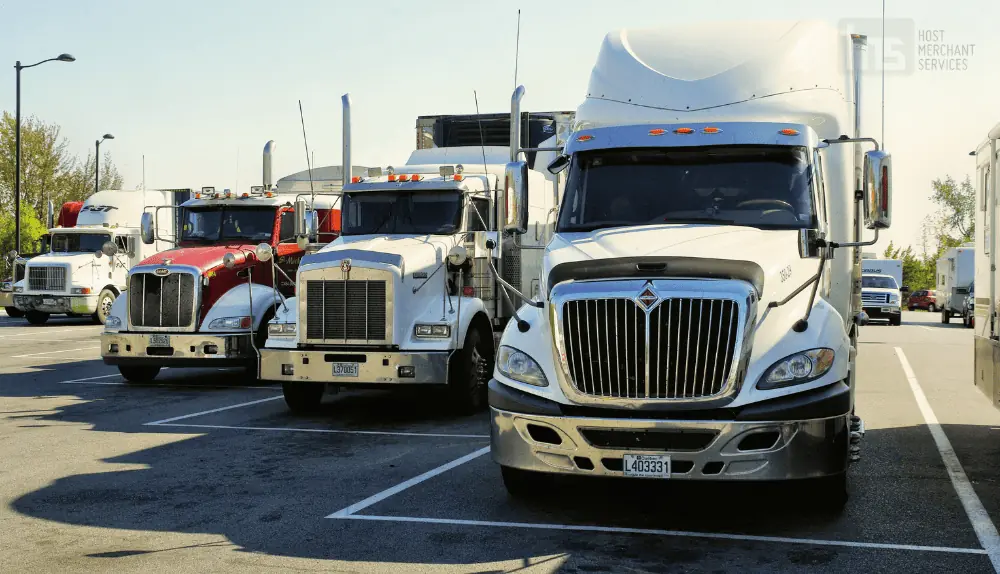Securing the best trucking business loans for 2024 is crucial for the success and growth of truckers and startup trucking companies. In the dynamic landscape of the trucking industry, access to financing plays a pivotal role in addressing the unique financial needs of these businesses. Whether it’s acquiring trucks and equipment, managing cash flow gaps due to delayed payments, or investing in expansion, business loans provide the necessary capital.
Recognizing the importance of tailored financing options, and understanding the financial needs specific to the trucking industry is vital in identifying the best loan solutions to propel the growth and profitability of truckers and startup trucking companies.
This article delves into the top business loan options for trucking companies and similar startups in the industry.
Understanding the Financial Needs of Trucking Companies

Overview of the Trucking Industry’s Financial Challenges
The trucking industry presents unique financial challenges for companies, including the high costs of acquiring and maintaining a truck fleet. Expenses such as vehicle purchase, insurance, fuel, maintenance, licensing fees, and safety compliance can be substantial. Managing these financial obligations requires careful planning and capital access. Fuel price volatility further adds to the complexity, making it crucial for trucking companies to have strategies in place to mitigate the impact of fluctuating costs.
Common Expenses and Cash Flow Considerations
To maintain healthy cash flow, trucking companies must effectively manage recurring expenses such as driver payroll, fuel costs, maintenance, insurance premiums, permits, taxes, and facility payments. Understanding these expenses and implementing robust budgeting and cash flow management practices is essential. Cash flow considerations are critical for trucking companies, as delays in client payments can strain finances. Access to working capital is vital during these payment gaps to cover operational expenses and ensure a strong financial position.
Importance of Working Capital for Trucking Companies
Working capital is essential for the daily operations of trucking companies, covering expenses like fuel, driver salaries, maintenance, and emergencies. Trucking companies require sufficient working capital to ensure smooth operations and capitalize on growth opportunities. Immediate access to funds is crucial due to longer payment cycles in the industry. Business loans and financing options provide the necessary working capital for trucking companies, enabling them to overcome financial challenges, pursue new opportunities, invest in growth, and remain competitive.
Types of Business Loan Options for Trucking Companies

Traditional Bank Loans
Traditional bank loans have long been a go-to option for businesses, including trucking companies, seeking financing. They offer various benefits and considerations that trucking companies should be aware of when exploring loan options.
Pros and Cons of Bank Loans for Trucking Companies
Pros:
- Competitive interest rates: Banks generally offer lower rates than alternative lenders, making bank loans an attractive option for trucking companies looking to minimize borrowing costs.
- Established reputation: Traditional banks have a long-standing presence in the lending industry, often instilling confidence and trust in borrowers.
- Relationship building: Working with a bank can help establish a long-term relationship, potentially opening doors for future financial opportunities and services.
Cons:
- Stringent eligibility criteria: Banks typically have strict requirements for loan approval, including a strong credit history, established business track record, and collateral.
- Lengthy application process: Bank loan applications often involve extensive paperwork and a thorough review process, resulting in longer approval times.
- Limited flexibility: Banks may have specific restrictions and limitations on how funds can be used, potentially limiting the freedom to allocate funds as needed.
Eligibility Criteria and Application Process
Trucking companies typically need to meet certain eligibility criteria to qualify for a bank loan. These may include:
- Good credit score and credit history
- Stable cash flow and financial statements
- Proof of business profitability
- Collateral, such as vehicles or property
The application process for a bank loan usually involves:
- Gathering necessary financial documents, such as tax returns, bank statements, and business financial statements.
- Completing a loan application form provided by the bank.
- Applying along with the required documentation.
- The bank is undertaking a thorough review and evaluation process.
Examples of Banks Offering Loans to Trucking Companies
- Wells Fargo: Offers trucking equipment loans and lines of credit for various trucking needs.
- Bank of America: Provides financing solutions for trucking companies, including loans for equipment purchases and working capital.
- JPMorgan Chase: Offers customized lending solutions for transportation companies, including trucking businesses.
Small Business Administration (SBA) Loans
The Small Business Administration (SBA) offers loan programs to support small businesses, including trucking companies. These programs provide unique advantages and considerations for trucking companies seeking financing.
Overview of SBA Loan Programs Available for Trucking Companies
The SBA offers several loan programs that can benefit trucking companies, such as:
- SBA 7(a) Loans: This program provides general-purpose loans for various business needs, including equipment financing and working capital.
- SBA 504 Loans: These loans are for fixed asset purchases, including trucks and trailers.
- SBA Microloans: Microloans offer smaller loan amounts, making them suitable for startups or smaller trucking companies.
Advantages and Disadvantages of SBA Loans
Advantages:
- Lower down payment requirements: SBA loans often have lower payment requirements than traditional bank loans, making them more accessible to trucking companies with limited capital.
- Longer repayment terms: SBA loans typically offer extended repayment terms, allowing trucking companies to manage their cash flow more effectively.
- Guarantees and Support: SBA loans may come with guarantees or support from the SBA, reducing the risk for lenders and potentially increasing the chances of loan approval.
Disadvantages:
- Stringent eligibility criteria: While SBA loans provide advantages, they still have eligibility requirements that need to be met, such as a good credit history and collateral.
- Lengthy application process: The application process for SBA loans can be time-consuming, involving detailed paperwork and coordination between the borrower and the SBA-approved lender.
Eligibility Requirements and Application Process
Eligibility requirements for SBA loans may include:
- Good personal and business credit history
- Demonstrated ability to repay the loan
- Collateral for certain loan types
- Meeting the definition of a small business according to SBA size standards
The application process for SBA loans typically involves:
- Identifying an SBA-approved lender and discussing loan options.
- Preparing necessary documents, such as business financial statements, tax returns, and a business plan.
- Complete the SBA loan application and submit it to the lender.
- Working closely with the lender through the review and approval process, including any additional documentation or clarifications required by the SBA.
Equipment Financing
Equipment financing is a specialized loan option that focuses on funding the acquisition or leasing of trucks and related equipment. This type of financing offers specific benefits and considerations for trucking companies.
Importance of Equipment Financing for Trucking Companies
Trucking companies heavily rely on their fleet of trucks and equipment for their operations. However, the high costs associated with purchasing or leasing trucks can strain a company’s finances. Equipment financing addresses this need by providing funding specifically for acquiring or leasing trucks and equipment, helping trucking companies manage their cash flow while obtaining the necessary assets.
Types of Equipment Financing Options Available
Trucking companies can explore different types of equipment financing options, including:
- P loans: These loans provide funds to purchase trucks and equipment outright, with the equipment serving as collateral for the loan.
- Equipment leasing: Leasing allows trucking companies to access vehicles and equipment without the upfront ownership costs. Lease agreements typically involve regular payments for the use of the equipment for a specific duration.
- Sale-leaseback: In a sale-leaseback arrangement, trucking companies can sell their existing equipment to a lender and lease it back, freeing up capital while retaining the use of the equipment.
Benefits and Considerations of Equipment Financing
Benefits of equipment financing for trucking companies include:
- Preservation of working capital: By financing equipment purchases or leases, trucking companies can preserve their working capital for other business needs, such as fuel, maintenance, and hiring drivers.
- Flexibility and scalability: Equipment financing allows trucking companies to adapt and grow their fleet according to business demands without the need for significant upfront investments.
- Tax advantages: Depending on the specific structure of the financing arrangement, trucking companies may benefit from tax deductions on lease payments or depreciation of purchased equipment.
Considerations when opting for equipment financing include:
- Interest rates and fees: Trucking companies should carefully review the interest rates, fees, and repayment terms associated with equipment financing to ensure they align with their financial capabilities.
- Equipment condition and value: Trucking companies should assess the condition and value when considering used equipment to ensure they are obtaining reliable assets that meet their operational requirements.
- End-of-lease options: For lease agreements, understanding the options and obligations at the end of the lease term is essential to plan for future fleet upgrades or changes.
Invoice Financing and Factoring
Invoice financing and factoring provide financing options designed to address the payment gaps between invoicing clients and receiving payments. These options offer benefits and considerations for trucking companies effectively managing their cash flow.
Explanation of Invoice Financing and Factoring
Invoice financing and factoring involve obtaining funds based on outstanding invoices. In invoice financing, the trucking company uses unpaid invoices as collateral to secure a loan. In contrast, in factoring, the company sells the invoices to a third party (the factor) at a discounted rate in exchange for immediate cash.
How Invoice Financing and Factoring Work for Truck
Trucking companies borrow against their outstanding invoices for invoice financing, typically receiving a percentage of the invoice amount upfront. They repay the loan as clients pay the invoices.
In factoring, trucking companies sell their unpaid invoices to a factoring company, which immediately pays them a percentage of the invoice value, usually around 80% to 90%. The factoring company collects the full payment from the clients and deducts a fee before remitting the remaining balance to the trucking company.
Pros and Cons of Invoice Financing and Factoring
Pros of invoice financing and factoring include:
- Improved cash flow: Both options provide immediate access to funds in unpaid invoices, allowing trucking companies to cover ongoing expenses and invest in growth initiatives.
- Reduction of administrative tasks: Factoring companies often manage accounts receivable and collect, relieving trucking companies of administrative burdens.
- Accessibility for startups and businesses with limited credit history: Invoice financing and factoring can be viable options for trucking companies that may face challenges with traditional loan approval due to limited credit history or financial track record.
Cons of invoice financing and factoring include:
- Costs and fees: Invoice financing and factoring involve fees and discount rates that reduce the overall amount received from the invoices.
- Client relationship considerations: In factoring, clients may be directly contacted by the factoring company, potentially impacting the relationship between the trucking company and its clients.
- Dependence on client payment reliability: The trucking company’s cash flow is still contingent on the clients’ timely payments. Delays or non-payment by clients can create difficulties in repaying the financing or factoring obligations.
Alternative Lenders and Online Platforms
Introduction to Alternative Lenders and Online Platforms
Alternative lenders are non-bank financial institutions providing solutions tailored to specific industries and borrower profiles. Online platforms have emerged as a convenient and accessible way to connect trucking companies with alternative lenders, streamlining the loan application and approval process.
Advantages and Disadvantages of Borrowing from Alternative Lenders
Advantages of alternative lenders and online platforms include:
- Faster approval and funding process: Unlike traditional banks, alternative lenders often offer quicker loan approval and disbursement times, allowing trucking companies to access funds more efficiently.
- Flexibility in loan terms: Alternative lenders may provide more flexible repayment terms, such as adjustable payment schedules or alternative collateral options, accommodating the specific needs of trucking companies.
- Accessibility for borrowers with limited credit history: Alternative lenders may be more lenient with credit requirements, enabling startups and trucking companies with limited credit history to secure financing.
Considerations when borrowing from alternative lenders include:
- Higher interest rates and fees: Alternative lenders may charge higher rates and fees than traditional bank loans, reflecting the higher risk associated with lending to borrowers with limited credit history or financial stability.
- Reputation and credibility of the lender: Thoroughly researching and vetting alternative lenders and online platforms is essential to ensure legitimacy, credibility, and fair lending practices.
- Understanding the terms and conditions: Trucking companies should carefully review the loan terms, repayment schedules, and potential hidden fees before borrowing from alternative lenders.
Popular Online Platforms for Trucking Company Loans
- Fundera: Fundera is an online marketplace that allows trucking companies to compare loan options from multiple lenders and apply for financing that best fits their needs.
- Lendio: Lendio is a platform that connects small businesses, including trucking companies, with a network of lenders to facilitate loan applications and funding.
- BlueVine: BlueVine offers invoice factoring and lines of credit specifically tailored to the needs of trucking companies. It provides access to working capital based on outstanding invoices.
Factors to Consider When Choosing a Business Loan

When selecting a business loan for your trucking company, it’s important to carefully evaluate various factors to ensure you choose the best option that aligns with your financial needs and business goals. Here are key factors to consider:
Interest Rates and Fees
- Compare interest rates: Different lenders offer varying interest rates, so it’s crucial to compare and assess the rates being offered. Lower interest rates can significantly reduce the cost of borrowing, saving your trucking company money in the long run.
- Evaluate additional fees: In addition to interest rates, be aware of any additional fees associated with the loan. These may include origination fees, processing fees, prepayment penalties, or late payment fees. Understanding the full cost structure helps you assess the overall affordability of the loan.
Loan Terms and Repayment Schedules
- Repayment period: Consider the length of the lender’s repayment term. A longer repayment period may result in lower monthly payments but potentially higher overall interest costs. Assess your trucking company’s cash flow and financial projections to determine the most suitable repayment period.
- Payment frequency: Understand the repayment frequency options that are available. Common options include monthly, bi-weekly, or weekly payments. Choose a payment frequency that aligns with your cash flow and revenue cycles.
- Flexibility: Evaluate the flexibility of the loan terms. Some lenders offer options such as early repayment without penalties or the ability to adjust repayment schedules based on seasonal fluctuations in your business.
Collateral Requirements
- Collateral evaluation: Determine whether the loan requires collateral, such as trucks, equipment, or other business assets. Understand the impact this may have on your business and evaluate the value and potential risks of using collateral to secure the loan.
- Collateral requirements: Assess the lender’s specific collateral requirements. Some lenders may have stricter requirements than others. Evaluate whether you meet the collateral criteria and understand the implications in case of default.
Application and Approval Process
- Application requirements: Review the documentation and information required to complete the loan application. Understand the level of detail needed and the time it will take to gather and submit the required documents.
- Approval timeframe: Inquire about the typical approval timeframe for the loan. Some lenders may provide faster approvals compared to others. Consider the urgency of your funding needs and choose a lender with a suitable turnaround time.
- Application complexity: Assess the complexity of the application process. Some lenders have streamlined online applications, while others may require in-person meetings or extensive paperwork. Choose a lender whose application process aligns with your preferences and capabilities.
Reputation and Customer Reviews of Lenders
- Research lender reputation: Conduct thorough research on the lender’s reputation and track record in the industry. Look for reviews, testimonials, and ratings from other trucking companies or small businesses that have borrowed from them. This can provide insights into the lender’s customer service, transparency, and reliability.
- Seek recommendations: Contact industry peers, business associations, or financial advisors for recommendations on reputable lenders known for their fair practices and favorable terms.
Conclusion
We have explored the importance of business loans for trucking companies and the unique financial needs they face. We discussed various types of loans available, including traditional bank loans, SBA loans, equipment financing, invoice financing and factoring, and alternative lenders. Selecting the right business loan is crucial for addressing financial challenges, maintaining cash flow, and supporting growth. We encourage trucking companies to thoroughly explore financing options and choose the loan that best suits their specific needs and long-term goals.
FAQs
What are the eligibility criteria for traditional bank loans for trucking companies?
Eligibility criteria for bank loans may vary but commonly include a strong credit history, minimum annual revenue, and a well-documented business plan. Lenders may also consider the company's financial stability, collateral availability, and industry experience.
How does invoice financing work for trucking companies?
Invoice financing allows trucking companies to access funds by selling their outstanding invoices to a lender at a discounted rate. The lender advances a percentage of the invoice value upfront, and when the client pays the invoice, the remaining balance (minus fees) is released to the trucking company.
What types of equipment can be financed by trucking companies?
Trucking companies can finance various types of equipment, including trucks, trailers, refrigeration units, GPS systems, and other essential assets. Equipment financing allows companies to spread the cost over time, conserve cash flow, and ensure they have the necessary equipment to operate efficiently.
How can trucking companies qualify for Small Business Administration (SBA) loans?
To qualify for SBA loans, trucking companies must meet certain requirements, such as being a for-profit business operating in the United States, having a sound business purpose, demonstrating good character and creditworthiness, and showing the ability to repay the loan. Meeting SBA size standards is also essential for eligibility.

